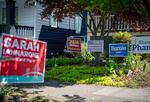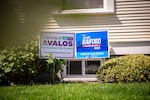Pre-pandemic, Beaverton City Councilor Lacey Beaty believed she would become the city’s next mayor by knocking on 15,000 doors.
Through her doorstep pitch, the youngest councilor elected in Beaverton history planned to persuade a critical mass of voters to oust Mayor Denny Doyle, who has won three terms and now seeks a fourth.
“That was really, I believed, my path to victory,” she said.

Several yard signs for local candidates are displayed in front of a house in the Southeast Portland, Ore., neighborhood of Brooklyn on Monday, April 20, 2020.
Bryan M. Vance / OPB
Beating an incumbent is an uphill battle under the best of circumstances. Political strategists say the pandemic has made that incline a lot steeper.
“In a city like Beaverton, you could knock doors. You could hold enough public events where there's 100 people at them, and you could reach enough voters to really overcome that incumbent advantage,” said Jack Miller, a professor of political science at Portland State University. “And now what is she left doing?”
While the pandemic has changed the dynamics of all campaigns, it has dealt a particularly brutal blow to new and insurgent candidates. They’ve seen the lower-cost strategies most likely to bring them some name recognition — door-knocking, small events, word-of-mouth — turn into public health hazards.
“The primary driving force of local and state campaigning is now unavailable entirely,” Miller said.
Related: Gov. Kate Brown Details Her Plans For Reopening Oregon
Beaty, 35, contends she’s not shut out. Phone calls, she said, are proving to be a surprisingly good substitute with many potential voters at home bored and happy to banter. Plus, she began knocking in late December and was able to get 8,000 doors under her belt herself before the statewide stay-at-home order came down. Her volunteers reached even more.
But starting door-knocking the same week as Christmas is not the norm in Oregon, where the season for local campaigning usually runs blissfully short. Compared with national races that begin well over a year before Election Day, many local races were poised to kick into high gear last month.

A screenshot of a virtual town hall on public safety organized by candidate Mingus Mapps on April 7. Mapps is running for the seat currently held by Portland Commissioner Chloe Eudaly.
Screenshot
Sarah Iannarone, an urban policy consultant vying to beat Portland Mayor Ted Wheeler, wanted to start knocking on 28,000 Portland doors mid-March. Mingus Mapps, a former city employee and political science professor up against Portland Commissioner Chloe Eudaly and former Mayor Sam Adams for a City Council seat, said his campaign events were just on the cusp of moving from living rooms into auditoriums. One of the early ones he participated in, at Southeast Portland’s Clinton Street Theater, came as people were being told to substitute handshakes for elbow bumps.
And then the state shut down.
“Almost within the same exact day of when you would be launching your grassroots outreach campaign at the beginning of March is exactly when all of this started to really come forward,” said political strategist Rebecca Tweed, who has consulted on upwards of 50 Oregon political campaigns. This cycle, she’s working on two judicial campaigns, two legislative races and campaigns for county commissioner and district attorney in Hood River.
Face-to-face contact, the heart of many grassroots campaigns, is now out of the question, leaving some candidates scrambling to find new ways to get their name out there before ballots hit the mail. Along with the old-school methods of direct mail and yard signs (now available for contactless delivery), candidates have started offering “virtual meet and greets” with voters. They’re hosting phone banking sessions on Zoom and throwing house parties on Google Hangouts.

A virtual phone banking session organized on Zoom by Portland mayoral candidate Sarah Iannarone. Iannarone is running to be Portland's next mayor.
Screenshot by Gregory McKelvey
It’s hard to tell how effective these alternative means of reaching voters will be versus showing up unannounced at a voter’s doorstep. “It's harder to get them to come into my Zoom room,” said Candace Avalos, a Portland State University adviser running for the City Council seat left open by Commissioner Amanda Fritz.
Even if candidates do manage to get their names and faces on voters’ computer screens, another COVID-19-induced hurdle awaits: how to get their local message to cut through the deafening buzz of a global pandemic.
John Horvick, a pollster with DHM Research, said he believes voter’s focus on COVID-19 could be the real blow for political newcomers. While Avalos and other first-time candidates may very well have a resonant message on housing stability and their community’s economic future, there may simply be too much going on for people to notice.
“Who knows what would have happened without COVID?” Horvick said. “There's probably some really talented, smart, capable candidates in that race who, because they can't get their message out right now, aren't going to be heard like they would have in some other campaign.”
Even candidates who had shored up support long before COVID-19 might find their message reaching a less responsive audience than they anticipated. In the Portland region’s last few elections, candidates running against the status quo have enjoyed big success: Eudaly, Commissioner Jo Ann Hardesty, Gresham City Councilor Eddy Morales. But analysts say this year’s crop of insurgent candidates could find that change-driven messages may not be as popular with voters as they were mere weeks ago.
“In the past, if you’ve been able to bottle your anger, anxiety ... you've had a chance to take out [former Commissioner] Steve Novick from the left,” said Len Bergstein, head of the consultancy firm Northwest Strategies, alluding to Eudaly’s upset victory over the incumbent Novick in 2016. “Is that really the message you want to take to people who don’t know whether they’re going to have toilet paper next week?”
This time around, the message that strategists say could resonate best with stressed-out voters is one that signals stability, a steady hand, experience leading in a crisis. A message, in other words, that’s going to sound smoothest coming out of the mouth of an incumbent.
“The advantage of incumbency probably hasn't been higher in my lifetime than it's going to be this year,” said Chris Edmonds, principal at the public relations firm Hubbell Communications, which is currently advising on a sheriff’s race in Deschutes County.
It’s not just the messaging that might advantage an incumbent; with no cocktail receptions, house parties or fundraising dinners, bringing in the money needed to run a campaign is hard across the board. But, Edmonds said, it’s particularly difficult for new candidates. While an incumbent can fall back on their old, preexisting donor base, new candidates need these events to create that base in the first place.
First-timers looking for small-dollar donations are similarly disadvantaged. Candidate Candace Avalos, who is taking part in Portland’s publicly financed election program, says she’s put fundraising to the sidelines. While the program allows candidates to take contributions of up to $250, Avalos says she was having the most luck with people who could only afford $5 to $15 donations, many of whom have been hit hard by the economic impacts of COVID-19.
Former Multnomah County Commissioner Loretta Smith, who is running a publicly financed campaign for the seat left open by the death of Commissioner Nick Fish, has also found fundraising a challenge. But Smith, active in Oregon politics for several decades between her work for U.S. Sen. Ron Wyden and her time at Multnomah County, has a network she can tap.
“To cold call people and ask them about money, it feels kind of weird,” she said. “What I’ve been doing basically is calling people who have already given me money and just asking them to max out."

A house displays signs for Canda Avalos, a Portland City Council candidate, and Teressa Raiford, a Portland mayoral candidate, in the front yard in the Southeast Portland neighborhood of Brooklyn on Monday, April 20, 2020.
Bryan M. Vance / OPB
Political consultant Paige Richardson said the pandemic has just made more glaring an inequity that was already present in these publicly financed campaigns, where small dollar donations are matched by the city 6-to-1; those with an established network will fare better than those without one.
“Pre-COVID, I think those folks were still finding, ‘Oh, This is harder than we thought,” she said. “Post-COVID, it's definitely harder.”
Candidates in races against incumbents and former elected officials argue these were always going to be uphill battles, which is why some have been working to establish themselves since long before COVID-19 came to Oregon. Iannarone said she began campaigning in July in order to build the “veritable army” she would need to unseat Mayor Ted Wheeler. And while she won’t get to her 28,000 doors, she can expand her support base in other ways: virtual house parties, virtual phone banks, virtual debates.
As for the argument that voters will cling to incumbents for experience under pressure, challengers aren’t buying it.
“We could kind of look at the federal government and know that not every person elected is stability at the top,” said Beaty, the Beaverton city councilor and mayoral candidate.
Beaty says it's difficult right now to predict if the pandemic will mean more familiar faces coming away victorious from the May primary than in a typical year. It is an election, analysts say, sure to get scrutinized in political science textbooks to come.
"We won't really know until a year from now when we're studying the outcomes of all these races," she said.
County elections offices will mail out ballots at the end of April.
